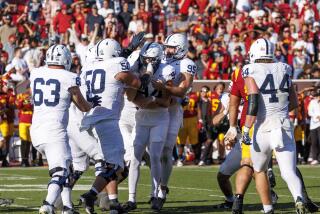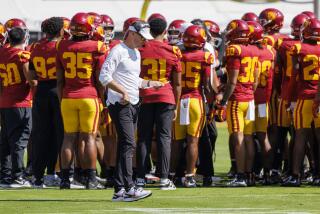USC’s penalties continue to pile up despite lectures
- Share via
USC players have heard endless coaches’ sermons about the evils of penalties.
They’ve been bombarded with sideline and locker room rants about the topic, and game officials were summoned to practices in an effort to keep them on track.
And still the Trojans reached double digits in penalties in a crushing defeat at Arizona on Saturday.
“I’m open for any suggestions,” Coach Lane Kiffin said after the game. “We’ve tried it all.”
On Sunday, Kiffin ordered the Trojans to watch a video montage of every major penalty they committed this season.
“We put it all together so they see the magnitude of what these things do,” he said.
Will it be enough?
USC, which faces second-ranked Oregon on Saturday at the Coliseum, shows no signs of shedding its status as the most penalized team in college football.
Against Arizona, the Trojans were flagged 13 times for 117 yards. Six were personal fouls.
“If you get a personal foul for something like a late hit, I always thought that was a sign of a guy who was really selfish or a loser,” former USC coach John Robinson said Monday. “Those stuck out in a different sense than an offensive lineman who gets a holding call where you’re just fighting to stay alive.”
Consider:
— USC has been penalized 82 times in eight games, 11 more than it totaled in 12 games last season. At their current pace, the Trojans would approach the school record of 128 penalties set in 12 games under then-coach Paul Hackett in 1999.
— The Trojans’ 82 penalties and 677 penalty yards are already more than their totals in five of the last 12 seasons.
— The Trojans have averaged 10.3 penalties a game, only a tick lower than the 10.4 they averaged in 1999.
Former Trojans All-American Ronnie Lott, a college and Pro Football Hall of Famer, said Monday that USC players must become more disciplined and accountable.
“All [Kiffin] can do is keep preaching to the guys, ‘Look, you can’t do this. You can’t do that,’” said Lott, an analyst for the Pac-12 Networks. “Ultimately, the player has to be able to say, ‘I’m willing to do this and not hurt our team.’”
Lott, a safety, played at USC from 1977 to 1980 under Robinson. The Trojans averaged 7.7 penalties a game in 1978, and finished atop the United Press International poll with a 12-1 record.
“If you did have a penalty,” Lott said, “[Assistant coach] Marv Goux had a way of letting you know that you weren’t going to do that again.”
USC averaged 122 penalties a season during Hackett’s largely unsuccessful tenure from 1998 to 2000.
Under former coach Pete Carroll, the Trojans won national titles in 2003 and 2004, averaging fewer than six penalties a game.
USC averaged 7.1 penalties in Kiffin’s first season as head coach and 5.9 last season.
That number has nearly doubled this fall.
Sonny Lubick, the former Colorado State coach whose 2000 and 2002 teams ranked as the nation’s least penalized, said the need to eliminate “foolish” penalties was paramount to his program because “we weren’t good enough” to overcome more talented teams.
Lubick has known Monte Kiffin, USC’s assistant head coach for defense, for years, and in 1999 Lane Kiffin served as a Colorado State assistant.
“I know they talk and preach discipline,” Lubick said. “We found that once the players make up their mind that they’re not going to beat themselves, once they buy into it, they can still play aggressively and cut down on penalties.
“But we had some years where we preached the same things and didn’t get the same result.”
Lott said players should be aware that officials are more conscious of certain infractions because of sensitivities about concussions and other issues.
Five other Pac-12 teams — Washington State, Washington, Oregon, Oregon State and UCLA — rank 93rd or worse among 120 major-college teams in penalties.
But change is possible.
Arizona State, the most-penalized team last season under former coach Dennis Erickson, has committed the eighth fewest under first-year Coach Todd Graham.
Robinson, who works as a fundraiser for USC, said Kiffin and the coaching staff must keep hammering away.
“You can’t become so obsessed with it that you change how you treat people or just the way you coach,” Robinson said. “You’ve got to keep coaching, and coaching it hard and hope something gets through.”
Some USC players are as perplexed as their coaches.
“I was hoping that we’d turned the corner and had hopefully figured it out,” center Khaled Holmes said after the Arizona game. “Unfortunately, it set us back.”
Cornerback Nickell Robey said the solution was not complicated.
“It starts at practice … by doing all the little things that can prevent us from ending up in a situation like this,” he said. “It can definitely be solved.”
twitter.com/latimesklein
More to Read
Fight on! Are you a true Trojans fan?
Get our Times of Troy newsletter for USC insights, news and much more.
You may occasionally receive promotional content from the Los Angeles Times.







